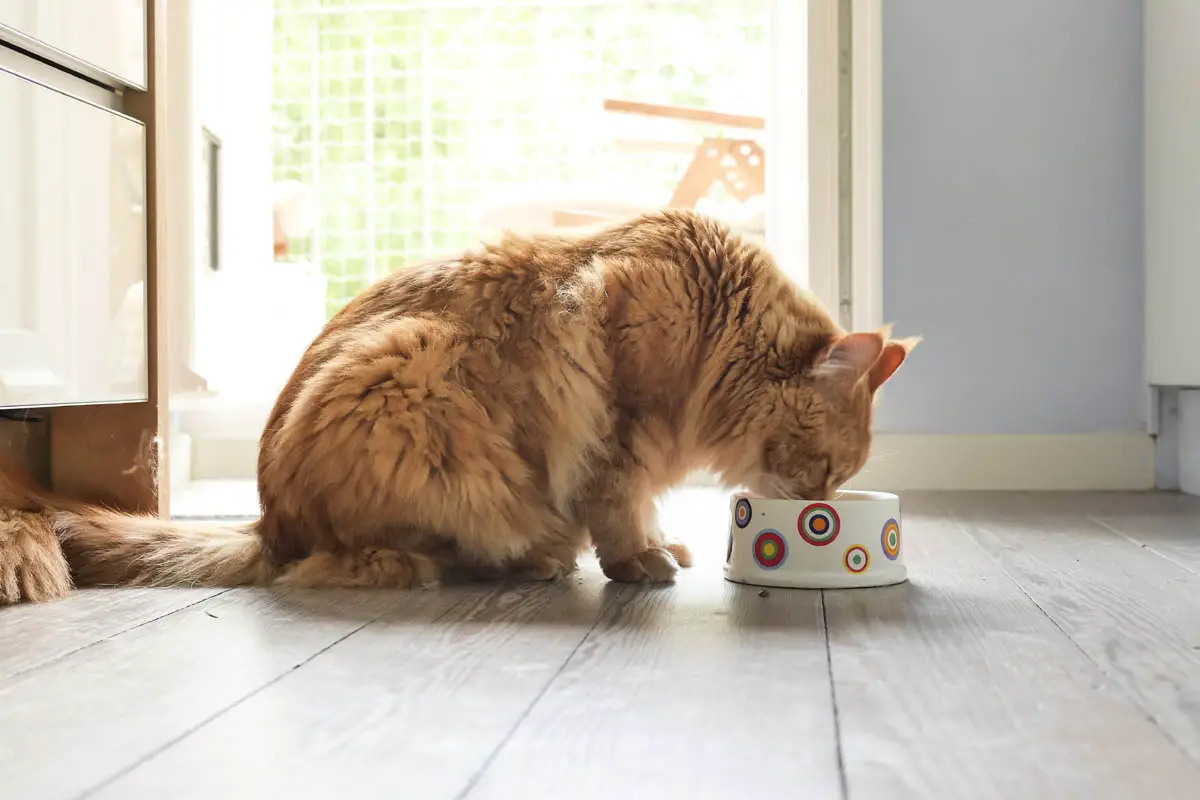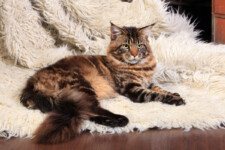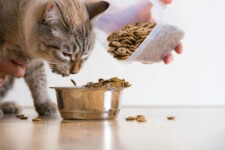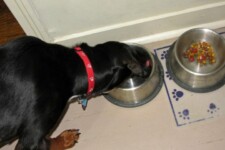Maine Coon Raw Food Diet (Pet Safe Food Guide)
While most Maine Coons have no special dietary restrictions, feeding these giant kitties the right diet increases the likelihood of a long and healthy life.
If you want to switch your Maine Coon to a raw food diet, it’s important to understand both the benefits and potential dangers of this diet.
Similar to other breeds, Maine Coons require a balanced diet consisting of high amounts of protein and other nutrients. Incorporating raw food into the diet of a Maine Coon helps ensure these large cats eat a nutritiously rich diet.

In this guide, we’ll explore why a growing number of Maine Coon owners are feeding their cats a raw food diet, and how to transition your Maine Coon cat to raw food.
What Are the Advantages of a Raw Food Diet for Your Maine Coon?
With such a wide array of pet food brands available, conflicting online reviews and frequent cat food recalls, selecting food can be overwhelming when you want to make the healthiest choice for your cat .
One of the biggest advantages of a raw food diet for your Maine Coon is the certainty of knowing exactly what your Maine Coon is eating.
Sourcing the ingredients and preparing it yourself eliminates the anxiety of trusting a certain pet food brand with the health and safety of your cat.
It also reduces the chances of your Maine Coon ingesting preservatives and fillers that trigger an allergic reaction or sensitivity in their digestive tract.
In the wild, cats typically eat the raw flesh of small prey. This means that raw food is more akin to the natural diet of Maine Coons than commercially packaged dry or wet cat food.
Another benefit of serving your big kitty some raw food is the cost. Purchasing high-quality ingredients yourself is usually more cost-effective than buying expensive packaged cat food.
Due to their large size, Maine Coon cats require a greater serving of protein than most cats.
Transitioning to raw food allows you to ensure that your kitty is getting enough protein along with other essential nutrients.
What Are the Risks of Feeding Your Maine Coon Raw Food?
Despite the benefits of a raw food diet for your Maine Coon cat, there are a few health risks to consider.
According to the American Animal Hospital Association, raw food diets can increase the risk of salmonella and other contamination.
Since meat for human consumption can sometimes contain pathogens, it might not be the safest for your cat to eat raw.
There’s also a chance of zoonotic disease transmission which places small children, and people with low immune systems at risk of contracting a disease from pets on a raw food diet.
In contrast, some veterinarians insist that the risks of bacterial contamination are minimal if the owner takes proper precautions.
As long as you remain mindful of where you source your meat, feeding your cat a raw homemade meal can be better alternative to commercially bought cat food.
The Nutritional Basics: Dietary Requirements of Maine Coons
According to the Association of American Feed Control Officials (AAFCO), the nutritional requirements of growing kittens and pregnant cats are:
- Crude Protein (30%)
- Crude Fat (9%)
- Minerals (calcium, phosphorus, potassium, sodium, chloride, magnesium, iron, copper, manganese, zinc, iodine, and selenium)
- Vitamins (vitamin A, vitamin D, vitamin E, vitamin K, thiamine, riboflavin, pantothenic acid, niacin, pyridoxine, folic acid, biotin, vitamin B12, choline, and taurine)
For adult maintenance, the recommended nutrients are identical except for protein.
All cats including Maine Coons only require a diet composed of about 26% crude protein to maintain a healthy body weight.
Many vets agree that protein is the most crucial component of a balanced feline diet, especially for giant breeds such as the Maine Coon.
Animal proteins such as red meat, poultry, and fish are the recommended source of protein.
How To Make a Nutritious Raw Meal for Your Adult Maine Coon
For Maine Coon owners who want to switch their adult cat to a balanced, raw diet, the recipe below is created and tested by veterinarian, Dr. Lisa Pierson.
Since Maine Coons are the largest cat breed, this recipe will likely yield enough food for about 10 days.
Ingredients:
- 3 lbs of poultry thigh meat, bones, and skin (or 2 lbs of ground rabbit and 1 lb of poultry meat)
- 1 cup of water
- 2 eggs (no shell)
- 5,000-10,000 mg of fish oil
- 400 IU or 268 mg of vitamin E
- 25 mg of vitamin B-complex
- 2000 mg of taurine
- 1 tsp of Morton Lite salt with iodine for all chicken (1/2 tsp if using a combination of rabbit and poultry meat)
- 3-4 oz of chicken livers (none of using a combination of rabbit and poultry meat)
Instructions:
- Ground meat, bones, and skin. Alternatively, you could bake the poultry meat at 350 degrees for about 15-20 minutes until it’s 50% raw.
- If using chicken livers, bake them for 20 minutes.
- Mix supplements together with the meat (and livers if any).
- Portion the food into containers and freeze what your Maine Coon will not consume in the next two days. This cat food should only be kept thawed in a refrigerator for 48-72 hours.
Other Tips for Feeding Your Maine Coon Raw Food
Be patient with your Maine Coon when switching diets. The ingredients in dry and canned cat foods are extremely addictive for kitties so it’s going to take time for your cat to switch to a new diet.
If your Maine Coon cat is picky, Dr. Pierson suggests adding a teaspoon of bacon fat to their meals.
This should add enough flavor to stimulate their appetite and persuade them to eat their meal.
She also advises against including vegetables, fruits, or grains in your Maine Coon’s diet. Since cats are naturally carnivores, these foods often cause sensitivities, allergies, and other issues in their digestive tracts.
While fresh bone is the preferred source of calcium for cats, bone meal is a better alternative than pre-ground grocery store meat for cat owners who have no access to a grinder.
Can Maine Coon Kittens Have Raw Food?
Based on the recommendations of the Royal Society for the Prevention of Cruelty to Animals (RSPCA), kittens should only be fed raw food after 20 weeks old.
However, raw food should only be fed to your Maine Coon kitten as a supplement to regular meals of high-quality wet food specifically for kittens. This prevents any harmful and potentially fatal nutritional deficiencies.
The RSPCA recommends selecting fresh, human-grade raw meat and raw meaty bones to offer to your kitten.
They also advise against meats such as sausages and other cooked manufactured meats that contain preservatives.
If your kitten has special dietary concerns or medical conditions, it’s best to consult with your vet before feeding them raw food.
Can Pregnant Maine Coon Cats Eat Raw Food?
The diet of a pregnant Maine Coon cat will need to be adjusted several times throughout their gestation period.
During pregnancy, female Maine Coon cats should be fed gradually increasing portions of nutritionally rich and balanced meals.
Some Maine Coon breeders suggest raw foods such as beef, chicken, turkey, and yolk for pregnant Maine Coons.
After giving birth, it’s a good idea to observe the eating habits of your Maine Coon as preferences in meat and other foods often shift.
Since the appetites of pregnant and post-pregnancy Maine Coon kitties increase substantially, owners might want to chop their meat into smaller pieces to reduce the risk of choking.
Tips for Feeding Raw Food to Overweight Maine Coons
An overweight Maine Coon cat could actually lose weight on a raw food diet. Since most instances of weight gain in cats are attributed to excessive amounts of carbohydrates, a diet consisting mainly of protein is ideal for weight loss.
In addition to decreasing the portion of carbs in their diet to less than 10% of their calories, owners can reduce the amount of chicken skin or fatty meats in the raw food of their overweight Maine Coon cat.
Discover more about the Maine Coon Tabby Mix in our detailed breed guide.
References
Raw Protein Diet. (2011). American Animal Hospital Association. https://www.aaha.org/about-aaha/aaha-position-statements/raw-protein-diet/
What Should I Feed My Kitten? (2019). Royal Society for the Prevention of Cruelty to Animals (RSPCA). Retrieved from https://kb.rspca.org.au/knowledge-base/what-should-i-feed-my-kitten/




